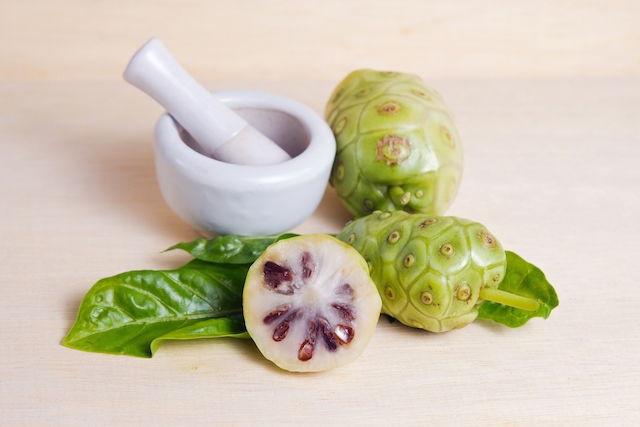Noni, a fruit that is scientifically referred to as Morinda citrifolia, originates from Southeast Asia, Indonesia and Polynesia. It is widely used in these countries due to its proposed medicinal and therapeutic properties.
This fruit contains anti-inflammatory, antioxidant, antimicrobial and hypoglycemic properties, making it beneficial for preventing chronic diseases, combating early aging and boosting immunity.
Noni can be found in both its natural form and in the form of juice. It is important to highlight, however, that excessive intake of noni fruit can be toxic to the body. Its safety has not been confirmed by studies, and you should speak to your doctor before consuming any quantity of noni.


Possible risks
Although this fruit has the potential to have various health benefits, excessive intake can be dangerous and lead to serious liver damage. This side effect was most commonly observed in people who consumed an average of 1 to 2 liters of noni juice over a period of approximately 4 weeks.
In addition, it has been found that concentrations of noni above 1000 mg/kg can have a toxic effect on the body. It can cause gastrointestinal irritation, general malaise and damage to the kidneys and liver. For safety reasons, it is not recommended to consume this fruit in any quantity before speaking to your doctor.
Possible benefits
To date, there have been few studies done on the therapeutic effects of noni. However, its composition is well-known and it is therefore possible to assume the possible benefits this fruit can provide. The nutrients that are found in noni include:
- Vitamin C and other natural antioxidants: these can help combat aging and prevent the onset of chronic diseases.
- Polyphenols, or phenolic compounds: these usually have a potent antibiotic and anti-inflammatory effect.
- Carbohydrates and proteins: these are important sources of energy.
- Beta-carotene and vitamin A: they can help promote collagen production and can be beneficial for the skin, hair and nails. These also strengthening the immune system and protect eyesight.
- Minerals such as calcium, magnesium, potassium, iron and phosphorus: these are important for promoting adequate organ functioning.
- Other phytonutrients, such as vitamins B1, B2, B3, B5, B6, B12, C, E and folic acid: they can reduce free radicals and regulate the body's metabolism.
However, it is important to remember that these benefits from noni consumption have not yet been proven, as there are not enough studies to prove their action, dose, contraindications and safety. For this reason, excess consumption of this fruit should be avoided.
Noni has very similar physical characteristics to graviola and fruta do conde, however, these fruits have very different properties.
Can noni treat cancer?
In popular culture, noni has been purported to potentially treat various diseases, such as cancer, depression, allergies and diabetes. However, safe consumption has not been scientifically supported and excess intake can put your health at risk. For this reason, the consumption of noni is not recommended until there is concrete evidence of its safety and efficacy, with tests carried out on humans.
At the moment, a substance called damnacanthal, a compound extracted from noni roots, is being studied in various cancer research studies, but without any significant results.
Can noni help with weight loss?
Despite the frequent reports that noni fruit helps with weight loss, it is not scientifically proven. More studies are needed to confirm this effect and the effective dose required to achieve it. In addition, it is normal to lose weight quickly when the body is not functioning adequately, and any weight loss from noni consumption may even be a result of its toxic effects.
